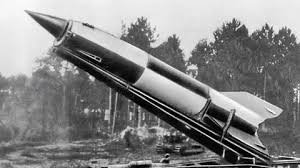
World War II was a conflict filled with technological innovation, desperation, and game-changing moments. Among Germany’s many ambitious wartime projects, the V2 missile program stands out. The world’s first long-range guided ballistic missile, the V2, symbolized a new era of warfare — one that could have drastically changed the outcome of World War II, had it succeeded fully.
But what would have happened if the V2 rockets achieved their intended strategic goals? Let’s explore this fascinating alternate history.
What Were the V2 Missiles?
The V2 (Vergeltungswaffe 2) was an advanced piece of technology, far ahead of its time. Developed by Wernher von Braun and his team, these missiles were capable of reaching the edge of space before plummeting down at supersonic speeds. Their primary targets were major Allied cities, including London and Antwerp.
Each V2 missile could deliver a one-ton warhead with devastating effect — but despite its fearsome design, the weapon was notoriously inaccurate and expensive to produce.
Why the V2 Missiles Did Not Succeed
Despite their technological prowess, the V2 missiles failed to have a decisive impact on the war for several reasons:
- Limited Accuracy: The missiles often missed their targets by miles, limiting their effectiveness against strategic military or industrial installations.
- High Cost: The production of V2 missiles drained enormous resources that Germany could hardly afford at that stage of the war.
- Timing: By the time the V2 came into operational use (late 1944), Germany was already on the defensive, struggling against overwhelming Allied advances.
- Inefficiency: Thousands of missiles caused tragic civilian casualties but did not significantly hinder Allied military operations.
What If the V2 Missiles Had Succeeded?
If Germany had perfected the V2 program earlier in the war — say, by 1942 or 1943 — and used it with greater accuracy and strategic targeting, several major shifts could have occurred:
1. Prolonged the War
Had V2 missiles crippled key Allied infrastructure or military hubs, the advance on Germany could have been slowed significantly. Disrupted supply lines, bombed ports, and ruined airfields would have made D-Day far riskier, perhaps even delaying the invasion of Western Europe by months or years.
2. Greater Civilian Pressure
Increased civilian casualties in Britain and continental Europe could have intensified political pressure on Allied governments. Calls for negotiation, particularly in Britain, might have grown louder if cities like London, Paris, or even Moscow were repeatedly bombarded.
3. Advancement of Rocketry
A more successful V2 campaign could have accelerated global interest in rocketry. The Cold War space race — spurred in part by V2 technology — might have started even sooner, fundamentally altering the pace of technological advancement.
4. Possible Peace Negotiations
While unlikely, if Germany had leveraged V2 terror strikes with conventional military successes, it might have forced the Allies to consider peace negotiations, particularly if the Soviet Union suffered similarly heavy civilian losses.
Would It Have Changed the Ultimate Outcome?
Despite these possibilities, it’s unlikely that V2 missile success alone would have secured a German victory. By 1944, Germany was facing insurmountable odds: depleted manpower, critical shortages of resources, and multi-front wars against much larger enemies. The V2, even if more effective, would have been a powerful weapon — but not a silver bullet.
Moreover, the Allies were investing heavily in countermeasures, including radar improvements and better anti-missile defenses. Once the United States’ industrial might and the Soviet Union’s relentless advances came fully into play, Germany’s defeat became almost inevitable.
Legacy of the V2 Missile
The true legacy of the V2 program lies in its technological achievements. After the war, both the United States and the Soviet Union raced to capture German rocket scientists. Wernher von Braun, for instance, would go on to lead NASA’s development of the Saturn V rocket — the vehicle that carried humans to the Moon.
Thus, while the V2 failed to turn the tide of war, it did change the course of history in another way: by ushering humanity into the Space Age.
Final Thoughts
The V2 missile was a marvel of engineering — terrifying, innovative, and decades ahead of its time. Yet, even had it succeeded beyond Germany’s expectations, the overwhelming global forces against the Nazi regime likely would have prevailed. Still, it remains one of the most fascinating “what-ifs” of World War II, blending military history with technological revolution.
Have a query? Contact Us
